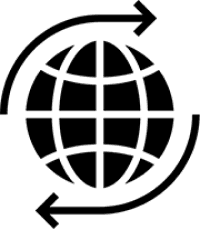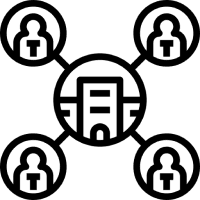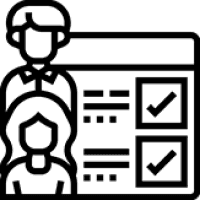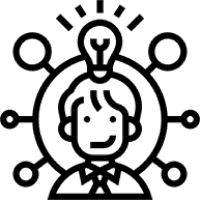EAC and Education & Training
Recognising the fundamental importance of education and specifically science and technology in economic development, the EAC focuses on harmonised curricula, examination, certification and accreditation institutions as well as joint establishment and support of scientific and technological research and identifying and developing centres of excellence in the region. Socio-economic development and the digital transformation in the EAC are to be enhanced through the promotion of innovative research, market-driven education and facilitation of trade in services in the ICT sector which will also enable East African civil society and the private sector to harness the benefits of digitalisation.
The German Government supports this EAC Sector under Core Area 1 of EAC-German cooperation as defined by BMZ 2030 – “Sustainable Economic Development, Training and Employment” in the Intervention Area of “Education & Training”. The cooperation directly contributes to implement two of the eight priority areas defined by the 6th EAC Development Strategy, namely “Strengthening Productive and Social Sectors” and “Awareness Creation”. The BMZ 2030 reform strategy focuses on a new quality of cooperation. More information on BMZ 2030 can be found here.

Education & Training
EAC-Germany Support

Digital Skills Training
The current development strategies of EAC Partner States demonstrate the importance of accelerating Information and Communication Technologies (ICT) in driving socio-economic development. Cutting-edge ICT infrastructure and expertise are key fundamentals for digitalisation in East Africa. Therefore, to complement tertiary education also the short-term digital skills development is essential for the digital transformation of the region. It closes the gap between academia offers and the needs of the industry and region for current employees and graduates. In the context of lifelong learning, technical training courses for ICT professionals are necessary to prepare them for the new innovative solution thinking. A key focus lies on the creation and access to advanced curriculum relevant to equip ICT professionals and experts with skills needed to boost economic growth and development.
Projects:
dSkills@EA (GIZ)
Objective: Short-term training courses for digital skills designed according to the needs of the industry have been successfully carried out.
Approach: The project develops and conducts market-oriented trainings to enhance digital skills of young people, the public and private sector. This includes:
- Increased capacities of university lecturers for online teaching as well as university IT staff for online learning systems.
- Increased capacities of business, especially SMEs, to apply digital technologies for business resilience.
- Increasing youth’s employability and digital skills capacities by facilitating trainings needed by the industries.
Find more information on dSkills@EA here.

Master’s Programme in Embedded and Mobile Systems (MSc EMoS)
Information and communication technologies (ICT) are increasingly becoming the EAC’s priority as a cross-cutting solution to its priority sectors and its industrialisation. In an increasingly competitive EAC regional market, being able to provide cutting edge services, academia needs to provide industry with skills needed to strengthen competitiveness of businesses in the regional and global market. Both quality and sustainability in tertiary education are a critical concern for any university program hastening digital skills and innovation. Advanced digital skills in ICT, when taught in a practice-oriented manner and with industry collaboration, derive benefits for digitalization while promoting socio-economic and political development of the EAC Partner States.
Projects:
dSkills@EA (GIZ)
Objective: The quality of the Master programme and study-related offers at the Centre of Excellence for ICT in East Africa is improved.
Approach: The project continues supporting the regional Centre of Excellence by further improving the quality and sustainability of the master’s program through:
- Strengthening the Academia-Private Sector engagement by facilitating the young professionals program for internships and applied Master Theses with companies in the region.
- The institutional quality at CENIT@EA is increased through trainings of lecturers and practice-oriented teaching is ensured for instance through fully equipped labs and guest lectures from the industry.
- Career services for CENIT@EA students are established and an alumni network is institutionalized.
Find more information on dSkills@EA here.

Innovation Transfer and Entrepreneurship Promotion
While supporting regional industrial and socio-economic development digital innovation is among EAC priority areas. The industrial capability in the EAC requires improvement and is faced by various challenges, including inadequate entrepreneurship skills. Locally made and research-based high-quality innovation addressing current challenges in industry and society is a key component for socio-economic development in the EAC. EAC Partner States through their institutions and organs in collaboration with various partners are in the efforts to further bring together national ecosystems, academia and actors to create, adapt, and test local initiatives, and ideas coalescing both local and scientific knowledge to promote entrepreneurship knowledge and innovation transfer.Projects:
dSkills@EA (GIZ)
Objective: Entrepreneurship opportunities for piloting digital innovative solutions are provided for 6 EAC Partner States through a regional digital innovation cooperation network.
Approach: Entrepreneurship offers to support digital ideas from 6 EAC Partner States are being provided through an innovation cooperation network. This includes:
- An international cooperation network with cooperation agreements is set up. Students and recent graduates are supported in their ideation of their business ideas.
- Technology transfer between universities and industry has improved.
- Improved job opportunities of unemployed youth in EAC and business resilience through digital innovation.
Find more information on dSkills@EA here.

Recognition of Regulated Professions
The benefits of professional mobility include economic growth, increased trade and investment, knowledge and technology transfer, and reduced brain drain. Harmonising labour policies, national laws, and programs can create a conducive environment for professional mobility. Recognising each other's conformity assessment procedures can help streamline the process of evaluating and certifying services, which can save time and money for service-oriented businesses and individuals. Mutual Recognition Agreements (MRAs) can be challenging to negotiate and implement, and they require finding common ground and agreeing on standards and regulations that are compatible within the Partner States and the respective national stakeholders. Moreover, the success of MRAs depends on the readiness to align national legal frameworks. Other factors that must be addressed amenably are political considerations, such as trade imbalances, protectionism, and geopolitical tensions. These can lead to obstacles and delay in the negotiation process. Ultimately, promoting professional mobility is an important step towards achieving regional integration and promoting economic development. Partners can unlock new opportunities for growth and cooperation by working together to facilitate the free movement of professionals, while also strengthening their individual economies.Projects:
DIGEAT (GIZ)
Objective: Facilitating the cross-border mobility to the labour markets in the EAC Partner States for regulated professions under the MRAs.
Approach: DIGEAT assists Partner states in promoting engineers' mobility to foster economic success through strengthening regulatory framework to support the movement of professionals.
Find more information on DIGEAT here.

Higher Education
To foster regional integration, cross-country learning and exchange, as well as the mobility of skilled personnel throughout the EAC, the EAC Secretariat is working with its German partners to provide opportunities for education and training for students and professionals from the EAC Partner States. Students are supported with scholarships and training opportunities in selected disciplines especially relevant for the region and the integration process, such as business, maths & informatics, health and communications/media. The projects encompass scholarships for a regional exchange programme at Master’s level coordinated by IUCEA, as well as sector-specific academic programmes and professional development courses for health and media professionals in cooperation with the Aga Khan University.
Projects:
Leadership to Foster Regional Integration (KfW)
Objective: The EAC Scholarship Programme aims at creating future change agents, who identify themselves with the integration agenda of the EAC and are willing to share economic and development-oriented expert knowledge. The goal of this initiative is to contribute towards training leaders who will foster the EAC Regional Integration. It supports skilled but economically disadvantaged master students.
Approach: The project focuses on academic collaboration and an identity-building exchange programme between universities in the EAC Region, in the subjects relevant for the economic integration of the EAC. It encourages and supports students to study in countries other than their own. The expansion of the network of universities and master’s students and the regular exchange within the scholarship programme will promote the exchange of knowledge across countries in the EAC.
The project offers - through the Inter-University Council of East Africa (IUCEA) - financial support for academically skilled but economically disadvantaged students for a master course in another EAC country. The focus is on Mathematic, Informatics, Science, Technology (MINT) and Business Science. Women are especially encouraged to join the programme. This will support women’s participation in the EAC and increase gender equality.
In order to achieve these impacts the Project finances a comprehensive package:
- Offering scholarships for Master Students from across the EAC Partner States for an exchange master programme
- Offering mentoring, networking events and further leadership training activities.
Further activities of the Programme are the support of short-time trainings for EAC employees, based on the need to implement the four pillars of regional integration strategy (custom union, internal market, monetary union, political confederation).
The project is financed by the German government through KFW in the context of the EAC-Germany cooperation.
AKU-SONAM (KfW)
Objective: The project aims to strengthen the education and professional development of health workers in East Africa. The availability of quality care is extended, with the aim of contributing to improving the health of the East African people.
Approach: The Aga Khan University (AKU) offers a wide range of long-term academic programmes, as well as continued professional education courses for health professionals in East Africa. The German Government is providing support to AKU’s School of Nursing and Midwifery (SONAM), within the framework of EAC-German cooperation in the area of skills development / education, with regard to:
- The Financing of scholarships for nursing and midwifery students, as well as participation in short courses on a broad range of topics.
- The construction of an academic building and student housing on AKU’s campus in Kampala, Uganda. The latter will provide accommodation for students from across the region, especially for a future regional programme in nursing.
AKU-GSMC (KfW)
Objective: To foster quality journalism through investments in teaching, training and innovation, with the ultimate aim of strengthening the media landscape across East Africa and contributing to access to quality journalism for the EAC citizens.
Approach: The project provides teaching and training opportunities for Graduates and media professionals by:
- Offering scholarships for Master’s students in Digital Journalism and Media Leadership & Innovation,
- Providing access to a broad training offer of professional development courses targeting media practitioners.
Further activities through the Media Futures project, implemented in cooperation with Deutsche Welle Academy, include:
- Support to innovative media start-ups through skills development and by providing access to seed funding, equipment, space and a network of media practitioners.
- Workshops, consultancies and media viability trainings for small to medium media houses
- Establishment of an Innovation Centre for media practitioners
- Dissemination of innovation in the media sector
Find out more about the Media Futures project here: mediainnovationnetwork.org